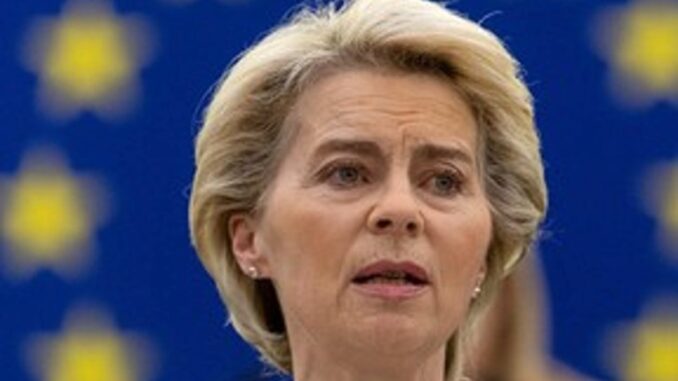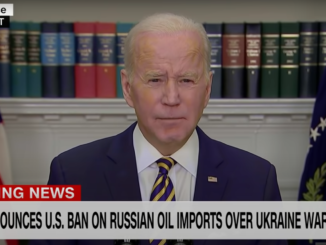
For most of its 66 years of existence, a vital part of the EU’s mission has been the inexorable expansion of its power to tell member states what to do. It now has to grasp though that in future it will need to backtrack. Unless Brussels morphs pretty quickly from a centralised technocracy dispatching orders to its vassals, into an organisation based on broad consensus between elected governments, it is likely to find itself side-lined or even facing a continental schism.
If you were looking for the most inept way to run an organisation like the EU, this comes close
The latest illustration of this arises from a sudden glut of Ukrainian grain. For the last nine years or so this has enjoyed largely tariff-free access to the EU. Until recently this was no big deal, since although Spain and the Netherlands imported a fair amount for cattle-feed, the rest of the Ukrainian grain nearly all went elsewhere, especially to the developing world.
War, however, has upset things. Mountains of grain have now been diverted to eastern Europe, which threatens to undercut and bankrupt local growers. In the last few days Hungary, Poland and Slovakia – all states with potent agricultural constituencies, and the last two with elections due this year – have reacted smartly, banning imports. Bulgaria may well follow suit, and farmers in Romania (where there is an election next year) have also been up in arms.
For anyone other than a Eurocrat, it’s difficult not to have a great deal of sympathy with the growers and the politicians behind them. Even given wartime shipment difficulties, the growers can argue that there are plenty of markets outside Europe for Ukrainian grain, and indeed people in them who have more need than Europeans. Furthermore, despite the whiff of protectionism, their governments’ quick action is very understandable. Free trade may generally be good, but no decent administration can stand aside and let globalism run riot when it creates a sudden and existential threat to a large part of its agricultural sector.
All this puts Brussels, which as a matter of EU law controls external trade, on the spot. True, the EU ostensibly backs Ukraine and its interests. Nevertheless, it also needs to stand behind its member states; they have every right to expect a thoughtful, nuanced and swift-footed reaction, or even some sympathetic words from Ursula von der Leyen. Unfortunately they have not got this. So far, the reaction from Berlaymont to the concerns of those in Warsaw, Budapest and Sofia has been a brusque emailed statement from the Commission in a kind of EU Dalek-speak. ‘We are aware of Poland and Hungary’s announcements… in this context, it is important to underline that trade policy is of EU exclusive competence and, therefore, unilateral actions are not acceptable.’
If you were looking for the most inept way to run an organisation like the EU, this comes close. For one thing, it shows up Brussels’s long-standing failure to understand eastern Europe. It has not grasped that, unlike in much of the West, large-scale relatively efficient agriculture is an important industry in the region that needs encouraging. If the EU understood this, it would not have peremptorily forbidden the governments of Poland, Hungary and Slovakia from doing what was necessary to avert an existential threat to their survival. Nor, for that matter, has much of the Eurocracy ever really comprehended that eastern states that until 30 years ago lived in the Russian shadow do not have the same unthinking loyalty to the supranational authority of Brussels as other member states.
For another, the chances are that the orders barked from Brussels will not be very effective, even if reinforced by orders from a complaisant European court. Previous attempts from the centre to impose measures seen by eastern European states as either affecting their internal affairs or their vital interests have not gone well. (Think, for example, of the order to Poland to shut down the Turów lignite mine, seen by the court as a matter of environmental tidiness but by the Polish government as an issue of keeping the lights on in Warsaw. Poland simply ignored the court’s order and declined to pay the fines imposed on it.) It is perfectly conceivable that elected governments who regard farmers, food and elections as more important than abstract propositions of European law will do the same if they are ordered to import Ukrainian grain that will hammer a large sector of their agricultural economy.
For the moment, despite a disastrous start, Brussels still has the opportunity to redeem itself and appear as a body on the side of the governments and voters who pay it. It could say that it will seek an urgent answer to the problem, if necessary agreeing to some temporary exclusion of the grain mountain from the EU market.
Will it? The signs are not good. It is more likely that the EU will see this as an abstract legal problem and call for harsh measures against those who disobey its orders. If it does, it will run the risk of becoming increasingly like the chancellery of some latter-day Holy Roman Empire, giving ever more stringent orders to vassals who take ever less notice. But that is perhaps too far down the line for the Brussels mandarins to worry about. By then, indeed, it could well be someone else’s problem.



